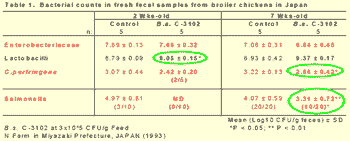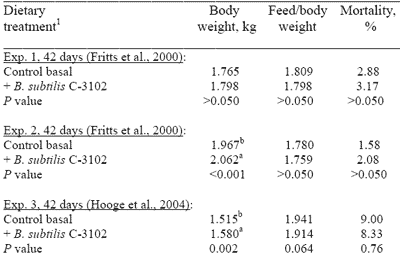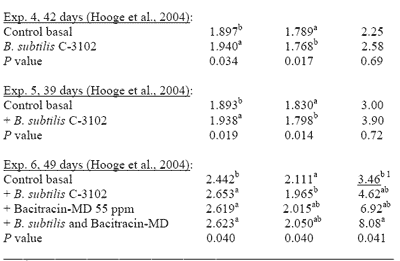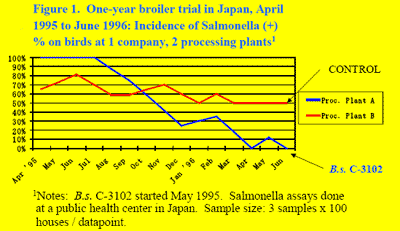Spores Improve Broiler Chicken
Dietary Bacillus subtilis C-3102 Spores Improve Broiler Chicken and Turkey Live Performance
Bacillus spores are emerging as a leading class of dietary direct-fed microbial (probiotic) performance enhancers for broiler chickens and turkeys, when antibiotics are removed, because they typically are effective, have high survivability through steam pelleting, and are economical.
Bacillus subtilis C-3102 spores (B.s. C-3102; CALSPORIN®, Calpis Co. Ltd, Tokyo, Japan) were selected from screening over 300 strains of beneficial bacteria, including several types of Bacillus spores.
The B.s. C-3102 spores were introduced commercially as an animal feed additive product in Japan in 1986. Today, the product is marketed in Asia, Brazil, European Union, and the United States, with the area of distribution continuing to expand globally as new regulatory approvals are obtained in different countries.
This article will summarize some information about the apparent mode of action, trial results, and expected benefits when using B.s. C-3102 spores in broiler chicken and turkey diets.
Mode of Action
Although some strains of Bacillus are capable of producing antibiotics or X-factors (e.g., bacitracin is obtained commercially from Bacillus licheniformis), and/or enzymes (e.g., Bacillus amyloliquefaciens is used commercially for starch hydrolysis), the main mode of action of B.s. C-3102 appears to be rapid oxygen consumption making the digesta more anaerobic which favors lactic acid producing bacteria.
Lactobacillus reuteri coating the intestinal tract, especially the crop and ceca, and other Lactobacilli are facultative anaerobes which proliferate under anaerobic conditions as shown by fresh fecal microbial assays.
Lactobacilli produce lactic acid which inhibits pathogens such as Clostridium perfringens, enterotoxic E. coli, and Salmonella. These declines in pathogen counts are also confirmed by fresh fecal microbial assays (Table 1).
Reduction in Clostridium perfringens numbers to safe levels within the intestinal tract when antibiotics are removed from poultry diets is required for prevention of necrotic enteritis and associated mortality. Pathogen reduction on poultry meat has become extremely important because a high level of food safety is required by modern customers.
Table 1.Bacterial counts in fresh fecal samples from broiler chickens in Japan
To enlarge the image, click here
Broiler Chickens
Fritts et al. (2000) at the University of Arkansas conducted two broiler chicken trials of identical design on litter to 42 days of age using diets with or without B.s. C- 3102 (Table 1). Broilers were grown with the control and treated birds physically separated and using different groups of caretakers to prevent cross-contamination.
The combined results indicated that inclusion of the direct-fed microbial significantly increased 42-day body weight and lowered 21 to 42 day feed conversion ratio. Significant reductions in aerobic plate count, coliforms (non E. coli), and Campylobacter on processed carcasses (by whole carcass rinse) were observed.
All 94 pre-chill carcasses of the birds fed the negative control diet were positive for Salmonella whereas only 41 of 96 carcasses of birds fed diets containing Bs were positive. The B.s. C-3102 improved live performance and reduced pathogen loads on broiler chickens experimentally.
Results of four broiler chicken pen trials (1998-1999), three at a commercial integrator's facility and one at a private research company, were reported by Hooge et al. (2004; see Table 2).
In experiments 1 to 3, straight-run Cobb 500 broiler chicks were grown to 42, 42, and 39 days, respectively. The dietary B.s. C-3102 significantly increased body weight in all experiments (average +0.051 kg or +2.90%) and decreased feed conversion ratio in 2/3 trials (average three trials -0.027 kg feed/kg body weight or -1.46%), without affecting mortality.
In experiment 4, on new litter with a used litter covering and relatively high stocking density (0.67 ft2/bird or 0.0622 m2/bird), Ross x Hubbard HiY equal mixed-sex chicks were grown to 49 days of age. On all sides of pens, 34 inch high corrugated paper was used to prevent crossover of test additive but provided minimal ventilation and caused wet litter.
Chick quality was substandard due to omphalitis. The B.s. C-3102 treatment gave best body weight and feed conversion results (+.202 kg or +8.66% and -0.146 kg feed/lb body weight or -6.92%) compared to control treatment though not significantly better than bacitracin-md (55 mg/kg) or bacitracin-md plus B.s. C-3102.
Mortality was significantly lower in control than the combined additive treatment (in which no culling and large differences in growth rate apparently increased mortality of weaker chickens). The B.s. C-3102 improved broiler chicken body weight and feed conversion ratio, and in a direct comparison successfully replaced bacitracin-md.
Table 2.Body weight, feed conversion ratio, and mortality of broiler chickens as affected by dietary supplementation with Bacillus subtilis C-3102 spores (3 x 105 CFU/g feed).

a - b Means in a column and experiment, with a common superscript, do not differ significantly at probability level stated. Mortality data analyzed after arcsine transformation.
1Mortality was higher in supplemented diet treatments apparently because culls chicks (omphalitis) were not removed and were much lighter than faster growing (competing) birds whereas in the negative control treatment, birds did not have such extreme weight differences.
Broiler Pathogen Reduction and Food Safety
Data from 4 trials evaluating microbial counts in fresh fecal samples from broiler chickens were presented by Hooge et al. (2007b).
In experiment 1 conducted in southern Japan (1993; see Table 3), B.s. C-3102 was added to all phases of broiler feeds at 0 or 3x105 CFU/g and excreta collected at 2 ages.
At 2 weeks, in the B.s. C-3102 flock fresh fecal Lactobacilli counts increased (P<0.05) and salmonella were not detected vs 4.97 Log10 CFU/g excreta in the negative control flock. At 7 weeks, Clostridium perfringens (3.22 vs 2.66 Log10 CFU/g excreta; P<0.05) and Salmonella (4.07 vs 3.31 Log10 CFU/g excreta, P<0.01; 20/20 vs 10/20, P<0.05) counts were reduced in the B.s. C-3102 flock.
Trials were conducted at a U.S. broiler company in 2005 to compare live performance of B.s. C-3102 fed flocks to that of previous antibiotic growth promoter (for necrotic enteritis prevention) fed flocks. Excreta was collected at 5 weeks.
In experiment 2, Lactobacilli (P<0.001) and Lactobacilli / Total Anaerobes % (22.9% vs 52.2%; P<0.05) were higher and Enterobacteriacae (coliforms) lower (P<0.01) in B.s. C-3102 fed birds. Livability was higher and farm condemnations lower in the 7 B.s. C-3102 fed flocks vs 4 previous antibiotic fed flocks (P<0.01), and caloric conversion was lower in the 7 B.s. C-3102 flocks vs 902 simultaneous antibiotic fed flocks (P = 0.014).
In experiment 3a, Lactobacilli (P<0.001) and Lactobacilli / Total Anaerobes % (21.2% vs 58.5%; P<0.01) were higher in B.s. C-3102 birds. In experiment 3b (same control as experiment 3a), Lactobacilli (P<0.001) and Lactobacilli / Total Anaerobes % (21.2% vs 54.8 and 59.5% P<0.001) were higher and Clostridium perfringens lower (P<0.05) in Bs C-3102 fed birds.
In each comparison, the B.s. C-3102 supplemented flocks had higher intestinal (excreta) Lactobacilli or Lactobacilli / Total Anaerobes %, lower pathogen counts, and/or improved performance, compared to simultaneous (or previous) negative control or antibiotic fed flocks.
Figure 1.One-year broiler trial in Japan, April 1995 to June 1996: Incidence of Salmonella (+) % on birds at 1 company, 2 processing plants1.
1Notes: B.s. C-3102 started May 1995. Salmonella assays done at a public health center in Japan. Sample size: 3 samples x 100 houses / datapoint.
Table 3. Influence of dietary Bacillus subtilis C-3102 spores (3 x 105 CFU/g feed) on fresh fecal microbial profiles (Log10 CFU/g excreta) compared to results for negative control broiler chickens (Experiment 1; Miyazaki Prefecture, Japan, 1993)

a – bLactobacilli at 2 weeks (P ≤ 0.05), Clostridium perfringens or Salmonella incidence per 20 samples at 7 weeks (P ≤ 0.05); and Salmonella populations at 7 weeks (P ≤ 0.01).
Turkeys
Blair et al. (2004) reported that B.s. C-3102 spores or zinc bacitracin (55 ppm) in Hybrid large white male turkey diets from the time of placement significantly increased 18 week body weight gain. There were 8 replicate pens of 24 poults each per treatment.
Litter ammonia volatilization in vitro was 7.8 ppm in B.s. C-3102 pens versus 25.2 ppm in control pens at 9 weeks. Processing yield was determined at the end of the trial. Results are shown in Table 3.
It was concluded that dietary B.s. C-3102 was equivalent to zinc bacitracin (55 ppm) for supporting body weight gain from 0-18 weeks of age and was superior to negative control for reducing ammonia emission from turkey litter at 9 weeks of age.
Table 5. Effect of diets containing Bacillus subtilis C-3102 spores (3 x 105 CFU/g feed), versus those with zinc bacitracin (55 ppm) or unsupplemented, on performance of Hybrid large white male turkeys 0 to 18 weeks of age (Blair et al., 2004)
a – bP ≤ 0.05 for body weight gain and P ≤ 0.001 for litter ammonia volatilization.
1Mortality adjusted feed/body weight. Mortality percentages were not reported but were stated to not differ significantly by treatment.
2In vitro ammonia volatilization from 30-33 g litter sample per pen from 5 (of 8) replicate pens per treatment (negative control or B.s. C-3102) at 9 weeks of age.
| Conclusion Bacillus subtilis C-3102 spores (CALSPORIN, Calpis Co. Ltd, Tokyo, Japan) are thought to act by vegetating in the upper intestinal tract and consuming oxygen, making the digesta more anerobic. This favors the proliferation of Lactobacilli, as demonstrated by fresh fecal microbial assays, which produce lactic acid, known to inhibit pathogens such as Salmonella, Clostridium perfringens, Escherichia coli, and Campylobacter. In one or more broiler chicken trials significant improvements in body weight and feed conversion ratio have been observed when using supplemented diets. Typically broiler chicken mortality has been unaffected by dietary treatments. In the turkey pen trial, 18-week body weight gain was significantly improved by dietary B.s. C-3102 spores compared to the unsupplemented controls. The zinc bacitracin and B.s. C-3102 supplemented diets were statistically equivalent for supporting body weight gain. The in vitro ammonia volatilization from litter in B.s. C-3102 fed turkey pens was significantly lower than from litter in negative control pens. It was concluded that B.s. C-3102 spores supplemented to broiler chicken or turkey diets may improve body weight and feed conversion ratio, and reduce intestinal pathogen populations. |
References
Blair, E. C., H. M. Allen, S. E. Brooks, J. D. Firman, D. H. Robbins, K. Nishimura, and H. Ishimaru. 2004. Effects of calsporin® on turkey performance, carcass yield and nitrogen reduction. Int. J. Poult. Sci. 3(1):75-79.
Fritts, C. A., J. H. Kersey, M. A. Motl, E. C. Kroger, F. Yan, J. Si, Q. Jiang, M. M. Campos, A. L. Waldroup, and P. W. Waldroup. 2000. Bacillus subtilis C-3102 (Calsporin) improves live performance and microbiological status of broiler chickens. J. Appl. Poult. Res. 9:149-155.
Hooge, D. M. 2007b. Dietary Bacillus subtilis C-3102 spores influence intestinal (excreta) populations of Lactobacilli, Clostridium perfringens, Enterobacteriaceae (coliforms), and Salmonella, and live performance of broiler chickens. Poult. Sci. 86(Suppl. 1):in press.
Author: Danny M. Hooge, PhD, PAS
Hooge Consulting Service Inc., Eagle Mountain, Utah - USA








